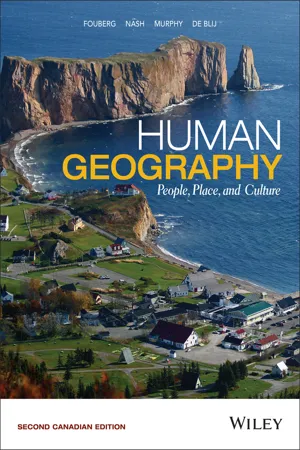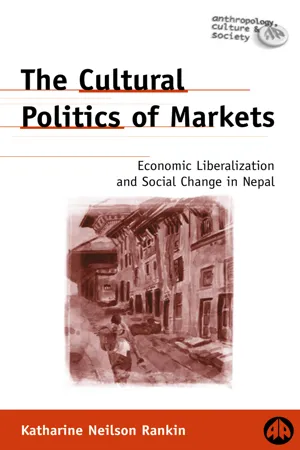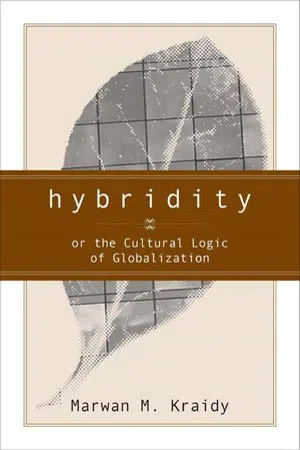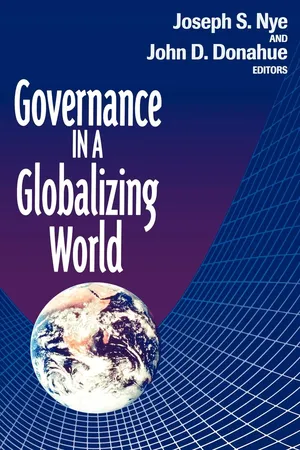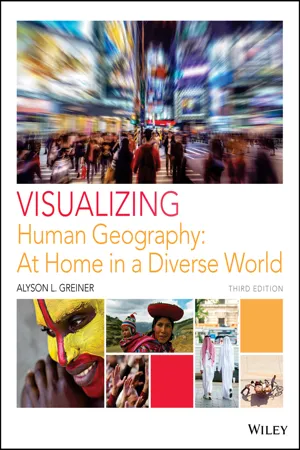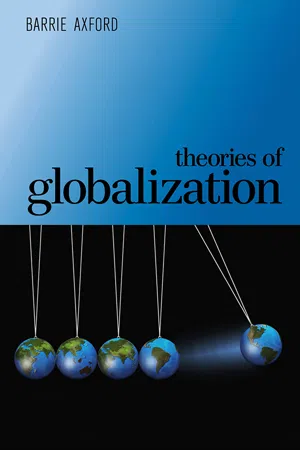Geography
Global Culture
Global culture refers to the shared values, beliefs, traditions, and practices that transcend national boundaries and are embraced by people around the world. It is shaped by globalization, technology, and interconnectedness, leading to the diffusion of ideas, languages, and cultural expressions across different societies. Global culture influences how people interact, communicate, and engage with the world.
Written by Perlego with AI-assistance
Related key terms
1 of 5
10 Key excerpts on "Global Culture"
- eBook - PDF
Human Geography
People, Place, and Culture
- Erin H. Fouberg, Alexander B. Nash, Alexander B. Murphy, Harm J. de Blij(Authors)
- 2015(Publication Date)
- Wiley(Publisher)
Human geography is not simply about document- ing the differences between places; it is also about understanding Global-local continuum The notion that what happens at the global scale has a direct effect on what happens at the local scale, and vice versa. This idea posits that the world comprises an interconnected series of relationships that extend across space. the processes unfolding at dif- ferent scales that produce those differences. What happens in an individual place is the product of interaction across scales. People in a local place mediate and alter regional, national, and global processes, in a process called “glocalization” (described in Chapter 2). The character of place ultimately arises from a mul- titude of dynamic interactions between local distinctiveness and events and influences on a wider scale. Geographers have approached the study of culture in differ- ent ways. The work of Carl Sauer and the Berkeley School domi- nated cultural geographical enquiry until the 1960s. This intellectual approach saw culture as a unified active agent in cre- ating or determining a cultural landscape that was in a constant SUMMARY Cultural geographers study how culture—a set of shared belief systems, norms, and values practised by a particular group of people—is reflected in landscapes and the built environment. Some geographers regard culture as a “way of life” that becomes visible in building styles, music, food, fashion, and language. FIGURE 8.34 Venice in Italy, Las Vegas, and Macao. (a) Venice, Italy, is an internationally renowned tourist destination. (b) The Venetian Hotel and Casino in Las Vegas is an attempt to create an “authentic” Venetian experience at a casino. (c) The Venetian Macao Resort is another example of cultural borrowing as the global city becomes a local attraction. - eBook - PDF
Geographies of Love
The Cultural Spaces of Romance in Chick- and Ladlit
- Christian Lenz(Author)
- 2016(Publication Date)
- transcript Verlag(Publisher)
62 | G EOGRAPHIES OF L OVE earlier: “Emerging from its antiquarian phase, cultural geography has begun to as-sume a more central position in the current rethinking of human geography.” (1992: 1) Proving Jackson’s assumption correct and maybe even surpassing it, “some writers assert that the recent developments in cultural geography imply that it will soon encompass all of human geography” (Lanegran 2007: 181). This statement suggests that cultural geography already incorporates many topics which (previ-ously) belong(ed) to human geography, albeit the broadly defined variety. It has affected human geography in such a significant way that ignoring the influence of the cultural turn on human geography means creating “sterile accounts of what [are] rich and complex human landscapes.” (Hubbard et al. 2002: 59) Raymond Williams identified culture as “one of the two or three most compli-cated words in the English language.” (2008: 16) In his 1983 essay, he goes on to trace the term culture and identifies various means such as culture being a reference to “ material production” or a reference to “ signifying or symbolic systems.” (Ibid.: 19, original emphases) Culture “has become a general term for the practices, symbols, and meanings that different groups refer to in claiming rights of recog-nition.” (Oakes and Price 2008a: 4) William Sewell Jr. ventures even further when he argues that culture [...] should be understood as a dialectic of system and practice, as a dimension of social life autonomous from other such dimension both in its logic and in its spatial con-figuration, and as a system of symbols possessing a real but thin coherence that is continually put at risk in practice and therefore subject to transformation. - eBook - PDF
Undoing Culture
Globalization, Postmodernism and Identity
- Mike Featherstone(Author)
- 1995(Publication Date)
- SAGE Publications Ltd(Publisher)
To talk about a Global Culture is equally to include these forms of cultural contestation. The current phase of globalization is one in which nation-states in the West have had to learn to tolerate a greater diversity within their boundaries which manifest themsleves in greater multiculturalism and polyethnicity. This is also in part a consequence of their inability to channel and manipulate global cultural flows successfully, especially those of people, information and images, which increases the demand of equal participation, citizenship rights and greater autonomy on the part of regional, ethnic and other minorities. Those who talk about such issues within nation-states are also more aware that they are talking to others outside the nation-state. That there is something akin to the formation of global public opinion was evident in the unfolding of the independence struggles of Lithuania and other nations within the Soviet Union, as well as in the Kuwait Gulf crisis and war in the early 1990s. Such incidents make us aware of the process of the formation and deformation of appropriate norms of behaviour within and between states, which while contested makes people more aware that there is a world stage and that the world is becoming one place. From the point of view of social 92 UNDOING CULTURE science, and sociology in particular, this should make us aware as Robertson (1992a) argues that the idea of a Global Culture is in the process of becoming as meaningful as the idea of national-societal, or local culture. Local culture It is striking that one of the effects of the process of globalization has been to make us aware that the world itself is a locality, a singular place. This is apparent not only in the images of the world as an isolated entity in space, which photographs of the earth from the moon provided, but also in the sense of its fragility, its finitude and openness to irreparable damage and destruction. - eBook - PDF
The Cultural Politics of Markets
Economic Liberalization and Social Change in Nepal
- Katharine Neilson Rankin(Author)
- 2004(Publication Date)
- Pluto Press(Publisher)
The strength of recent transcultural studies focusing on cultural flows and border crossings lies in documenting the diversity of globalization through the specific ‘conjunctures’ of movement and travel (Clifford 1988; Gupta and Ferguson 2002; Inda and Rosaldo 2002). As Tsing (2000: 10) argues, however, ‘the possibility that capitalisms and governmentalities are themselves situated, contradictory, effervescent or culturally circumscribed is much less explored’. Simply posing the local–global dichotomy obscures the multiple scales through which economic, political and cultural forms of globalization are mediated. GEOGRAPHIES OF GLOBALIZATION Geography offers some remedies to these limitations in the study of globalization, while at the same time suffering from its own weaknesses, which require anthropological perspectives for their redress. Geographers share the fundamental premise that all life is ‘placed’; in ‘situating’ social and economic processes, geographers approach space not as a neutral or fixed container of human activity, but rather as playing a structuring role in those processes. The emphasis on space lends geography a comparative tendency, useful for placing local processes in macroeconomic perspective. Geography can thus offer a spatial dimension to Gramscian interpretations of cultural politics; it offers a much-needed ‘geometry of power’, to borrow Doreen Massey’s (1992) now widely cited interpretation of space as an arena through which social relations of empowerment and disempowerment, domination and subordination, participation and exclusion, operate and continually transform social and physical nature. Much of the work on globalization in geography takes place within the subfield of economic geography, which views its task primarily in terms of documenting the spatial factors of capitalist accumulation and economic growth. Increasingly, however, the lines between economic and - eBook - PDF
Culture and Space
Conceiving a New Cultural Geography
- Joel Bonnemaison(Author)
- 2005(Publication Date)
- I.B. Tauris(Publisher)
Such duality is artificial since the two aspects co-exist in human beings. ON CONCEPTS OF CULTURE AND CIVILIZATION 57 Culture and social science In the pragmatic view of American geographers, all features that are not connected with nature are related to culture. It is the global human experience – what French geographers call ‘human geo-graphy’, albeit with a more restricted meaning. On a map, American geographers identify what is ‘natural’ (soil, hydrology, vegetation, relief, etc.) and what is ‘cultural’ (houses, paths, fields, crops, etc.). In other words, a geocultural feature represents what human beings have created. As such, it is a visible feature that can modify an environment. This type of feature is anthropic: 1 it delineates the humanized landscape. Culture is at the very heart of the discipline of ethnology. Each eth-nic group is identified by a specific culture, a highly complex pattern that must be understood as a whole. Any individual born in a society participates in a culture. Culture is collective and always refers to a community, be it a clan, a society, or the like. Herodotus said, ‘Custom is the king of all things’. To understand the custom that brings individuals together is to understand these individuals. 2 Basic needs are innate and universal, but the method to fulfil those needs may vary: there are many ways to feed oneself, sleep, be sheltered, or work. A culture meets universal needs through its own original creation, which is an arrangement of acquired and learned behaviours and attitudes. In this respect the ‘cultural breaking-in’ of children links back to the Greek definition of culture. This arrangement of behaviours and mental attitudes makes up a system wherein all elements uphold each other, like an organic structure. Ethnologists often describe cultures as holistic systems according to which each aspect can only be understood in relation to the whole. - Marwan M. Kraidy(Author)
- 2006(Publication Date)
- Temple University Press(Publisher)
Two decades later the word had already entered academic parlance, but it is the 1990s that witnessed the rise to prominence of the notions “Global Culture’’ and “cultural globalization.’’ As an innately interdisciplinary constellation of concepts and perspectives, “cultural globalization’’ differs from both the cultural imperialism thesis and the active audience group. That dissimilarity, however, should not distract from the intellectual debt that cultural globalization owes to both aforementioned media-research traditions, as Global Culture scholars have implicitly borrowed and adapted ideas from writings on both cultural imperialism and audience activity. Scenarios of Global Culture 39 Like “imperialism’’ in the 1970s and “postmodernism’’ in the 1980s, “globalization’’ is an infamously ambiguous word, “a maddeningly eu- phemistic term laden with desire, fantasy, fear, attraction—and intellec- tual imprecision about what it is supposed to describe’’ (Miller et al., 2001, p. 18). Its founding sociological narratives culminated in the early 1990s, when British sociologist Anthony Giddens (1990) described glob- alization as the “intensification of world-wide social relations which link distant localities in such a way that local happenings are shaped by events occurring many miles away and vice versa’’ (p. 64), and U.S. so- ciologist Roland Robertson (1992) defined it as “the compression of the world and the intensification of consciousness of the world as a whole’’ (p. 8). Swedish anthropologist Ulf Hannerz’s definition of a global “ecumene’’ as a “region of persistent culture interaction and exchange’’ (Hannerz, 1994, p. 137) reflects its anthropological underpinnings, con- ceived of by Arjun Appadurai (1994) in terms of disjunctive flows of people, capital, technology, images, and ideologies.- eBook - PDF
- Joseph S. Nye, John D. Donahue, Joseph S. Nye, John D. Donahue(Authors)
- 2000(Publication Date)
- Brookings Institution Press(Publisher)
5 Social and Cultural Globalization: Concepts, History, and America's Role OCIAL AND CULTURAL globalization is arguably the broadest, farthest-reaching dimension of the phenomenon, if we limit our examination of globalization to the human experience. It is deeply intertwined with the other dimensions identified by Keohane and Nye in chapter 1 of this vol-ume. As the cultural theorist John Tomlinson puts it, The huge transfor-mative processes of our time that globalization describes cannot be prop-erly understood until they are grasped through the conceptual vocabulary of culture; likewise . . . these transformations change the very fabric of cul-tural experience and, indeed, affect our sense of what culture actually is in the modern world. 1 Military globalization entails the movement of people and often social-political structures, often temporarily, but sometimes long term or even permanently—think of imperial Rome, for example, and the cities and towns it established or vastly expanded from Britain to North Africa to the Middle East and Central Asia. The same holds true for the other great global military-colonial expansions that preceded or followed Rome— Alexander's Greece, the Islamic Ummayad Caliphate, Spain, Britain, and France. Indeed, even the threat of nuclear annihilation during the cold war, which did not entail the movement of troops, had a significant cul-tural globalizing effect—disparate peoples the world over shared the same anxiety that they could be snuffed out with the push of a few buttons. 2 109 s NEAL M. ROSENDORF 110 NEAL M. ROSENDORF The economic dimension is as much about the movement of social val-ues and intellectual structures as it is about money and trade. Consider, for example, the linkage that Max Weber drew between the Protestant world-view and capitalism in his famous work on the subject. 3 Now consider the increasing global pervasiveness of capitalism as the dominant economic system in the twenty-first century. - eBook - PDF
Global Dimensions
Space, Place and the Contemporary World
- John Rennie Short(Author)
- 2004(Publication Date)
- Reaktion Books(Publisher)
Locality is produced through cultural practices. Appadurai gives the example of cricket in India, formerly ‘an instrument for socializing black and brown men into the public etiquette of empire, it is now an instrument for mobilizing national sentiment in the service of transnational spectacles and commoditiza-tion’. 9 Thus the sport that is firmly embedded in India’s colonial past is now a symbol of its independent national pride. Culture is not just passive audiences watching imported TV pro-grammes or eating fast food from global chains. Culture is an active process: one definition of culture is the tending, the husbanding of resources – the same root as cultivation . A culture is not just the consump-117 G L O B A L C U L T U R E S tion of things; it is the production of a world view, an aesthetic sensibility, the active creation of a history and geography, the working out of a place in the world. Cultural expression is as much a fact as cultural consumption. Culture is associated with place in complex ways; it is more than just a passive receptor, the end-point on the pathway of a global commodified culture. Culture involves the active use of these global flows into local, national and group-specific views of the world. To be sure, more people around the world can draw on a similar range of flows, but there is still a wide variety of cultural formations. In fact, cultural globalization has led to a more explicit concern with more local cultures as certain groups seek to redefine or re-establish their place in the world. When we speak about culture in the current debate on globalization there is a tendency to counterpoise a local, unchanging culture with a new, bland Americanized culture. But cultures are not unchanging, static remnants of bygone ages. Cultures are active processes of assimilation and hybridization. All cultures are mixtures of the global and local, the past and present. Cultures are not pure states, they are active processes of hybridization. - eBook - PDF
Visualizing Human Geography
At Home in a Diverse World
- Alyson L. Greiner(Author)
- 2017(Publication Date)
- Wiley(Publisher)
2 CHAPTER OUTLINE Globalization 30 • Contemporary Globalization • Global Flows of Financial Capital Cultural Impacts of Globalization 33 • Homogenization • Polarization • Glocalization The Commodification of Culture 37 • Advertising, Commodification, and Cultural Practice • Sports, Representation, and Commodification • The Heritage Industry • World Heritage ■ Where Geographers Click: UNESCO World Heritage List Cultural Geographies of Local Knowledge 43 • Local Knowledge • Geographies of Traditional Medicine • Cultural Ecology and Local Knowledge ■ What a Geographer Sees: Qanats ❑ Study the picture and read the opening story. ❑ Scan the Learning Objectives in each section: p. 30 ❑ p. 33 ❑ p. 37 ❑ p. 43 ❑ ❑ Read the text and study all figures and visuals. Answer any questions. Analyze key features ❑ Geography InSight, p. 39 ❑ Process Diagram, p. 45 ❑ What a Geographer Sees, p. 48 ❑ Stop: Answer the Concept Checks before you go on: p. 33 ❑ p. 37 ❑ p. 43 ❑ p. 49 ❑ End of chapter ❑ Review the Summary and Key Terms. ❑ Answer the Critical and Creative Thinking Questions. ❑ Answer What is happening in this picture? ❑ Complete the Self-Test and check your answers. CHAPTER PLANNER ✓ ✓ Courtesy Samoa News Archives Globalization and Cultural Geography TATTOOING AND GLOBALIZATION I f you have a tattoo, what does it mean to you? If you don’t have one, do you want one? Tattooing has a long history and is geographically widespread. It has been practiced by Samoans for more than 2000 years. To Samoans, the tattoo is a mark of distinction. Boys are often tattooed at puberty with designs extending from their waist down to their knees. Thigh tattoos are common among women, as shown in the photo. Among New Zealand Maori males, full facial tattoos employing spiral designs are not unusual, and some Maori women have tattoos on their chins, although these practices were more widespread in the past. - eBook - ePub
- Barrie Axford(Author)
- 2014(Publication Date)
- Polity(Publisher)
CHAPTER 3 Theorizing Globalization: Geography, Anthropology and Cultural and Communication StudiesGlobalizing Space: Geography and Globalization
The concerns raised by students of political science and sociology come together in the ‘geographer's metric for representing social relationships’, the map (Fraser, 2009, 1; Cox et al., 2008). As Nancy Fraser says, the ‘problematic of the map can lie dormant for long historical stretches, when a hegemonic frame is naturalized and taken for granted’ (2009, 2). The hegemonic frame is the territorial state and the bounded society, along with the Westphalian system of sovereign states. These days the mapping of political space is contested and the frame an object of struggle. Fraser's own interests lie in the framing of social justice, where the issue of which mapping of political space is truly just and who counts as a bona fide subject of justice – citizens of territories or transnational ‘communities of risk’ – are the key questions for analysts (Fraser, 2009, 4).The matter of spatial and temporal change is an integral part of globalization scholarship (Oke, 2009; Rosenberg, 2005; 2007). Analysing spatiality is geography's distinctive contribution to the study of ‘a single and interdependent world’ (Amin, 2002, 62), although not one unique to that discipline. Political geography in particular has a robust history of research with a global remit, and this is seen most clearly in the classic work of Halford Mackinder and others on geo-politics (1907; O’Tuathail, 1996).Since the revival of political geography in the late 1970s this engagement has been rekindled, so that when geographers today address the global a number of themes are extant and a variety of influences apparent. First is the very impulse to think globally. In a more recent review of state-of-the-art political geography, Kevin Cox and his co-authors (2008) refer to the ways in which the work of Fernand Braudel and Immanuel Wallerstein has influenced the writing of political geographers such as Peter Taylor (1994; Flint and Taylor, 2007; Dicken et al., 2001). For Taylor, relations between cities and localities, the state system and the global economy, reveal how the modern world works. The theme of complex relationality between actors and institutions situated at different spatial scales is central to the geography of globalization and constitutes the second emergent theme in current research. Perhaps the main problematic in such work is the ‘decoupling of power and the state’ (Helmig and Kessler, 2007, 240). When ‘political spaces no longer match geographical spaces’, the ‘banal statism’ of conventional IR theory and international law is more difficult to sustain (Kuus and Agnew, 2008, 98). The ramifications of this insight resonate through the work of many international or transnational economic and political geographers (Sassen, 2006; Agnew, 1994; 2005; O’Tuathail,
Index pages curate the most relevant extracts from our library of academic textbooks. They’ve been created using an in-house natural language model (NLM), each adding context and meaning to key research topics.
